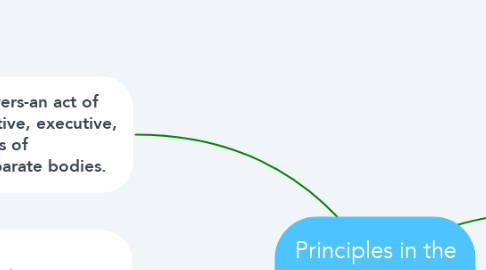Principles in the Constitution
by Rylee Pressley

1. Separation of powers-an act of vesting the legislative, executive, and judicial powers of government in separate bodies.
2. checks and balances-counterbalancing influences by which an organization or system is regulated, typically those ensuring that political power is not concentrated in the hands of individuals or groups.
3. judicial review-a process under which executive or legislative actions are subject to review by the judiciary
4. Federalism-the mixed or compound mode of government, combining a general government with regional governments in a single political system.
5. popular sovereignty- the principle that the authority of a state and its government are created and sustained by the consent of its people, through their elected representatives, who are the source of all political power.
6. limited government-defined as a governing or controlling body whose power exists only within pre-defined limits that are established by a constitution or other source of authority.
7. Republicanism-a political ideology centered on citizenship in a state organized as a republic under which the people hold popular sovereignty. Many countries are "republics" in the sense that they are not monarchies.


